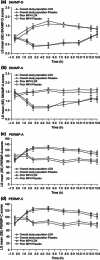Efficacy and safety of lisdexamfetamine dimesylate in children with attention-deficit/hyperactivity disorder and recent methylphenidate use
- PMID: 23681505
- PMCID: PMC3680667
- DOI: 10.1007/s12325-013-0027-2
Efficacy and safety of lisdexamfetamine dimesylate in children with attention-deficit/hyperactivity disorder and recent methylphenidate use
Abstract
Introduction: Lisdexamfetamine dimesylate (LDX) is a long-acting prodrug stimulant for the treatment of attention-deficit/hyperactivity disorder (ADHD). Post hoc subgroup analyses were performed from two studies in children with ADHD to compare the efficacy of LDX in participants who had received prior methylphenidate (MPH) treatment with that of the overall study populations.
Methods: Study 1 (7-week; open-label design) and study 2 (randomized, double-blind, placebo-controlled, crossover, laboratory school design) enrolled children aged 6-12 years with ADHD and baseline ADHD Rating Scale IV (ADHD-RS-IV) total score ≥28. Both studies excluded children whose prestudy ADHD treatment provided effective control of ADHD symptoms with an acceptable safety profile. Post hoc efficacy analyses were performed in children who had received MPH within 6 months of study enrollment. Efficacy measures included the following scales: ADHD-RS-IV, Clinical Global Impressions-Improvement (CGI-I), Expression and Emotion Scale for Children (EESC), Behavior Rating Inventory of Executive Function (BRIEF), Swanson, Kotkin, Agler, M-Flynn, and Pelham (SKAMP), and Permanent Product Measure of Performance (PERMP).
Results: In studies 1 and 2, 83/318 (26%) and 67/129 (52%) participants, respectively, had received MPH within 6 months and were not adequately controlled on current medication with acceptable tolerability; most of these participants had received long-acting MPH. In prior MPH participants, efficacy assessments demonstrated improvements from baseline (study 1) and versus placebo (study 2) that were comparable with those seen in the respective overall study population. Safety profiles were consistent with long-acting stimulant use.
Conclusion: In two studies, children who had received prior MPH treatment improved during treatment with LDX and experienced similar improvements in their symptoms as the overall study populations. For children with ADHD who were previously treated with MPH, LDX may, therefore, be an efficacious treatment option.
Figures






References
-
- Rader R, McCauley L, Callen EC. Current strategies in the diagnosis and treatment of childhood attention-deficit/hyperactivity disorder. Am Fam Physician. 2009;79:657–665. - PubMed
Publication types
MeSH terms
Substances
LinkOut - more resources
Full Text Sources
Other Literature Sources
Medical

